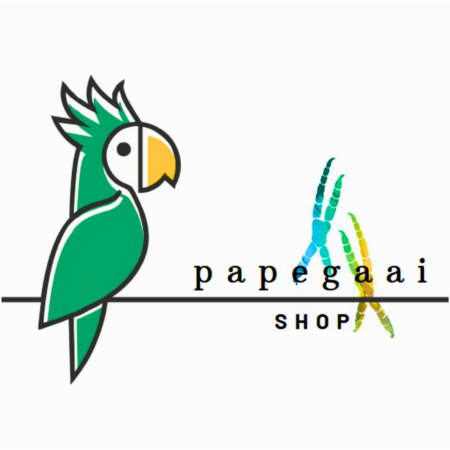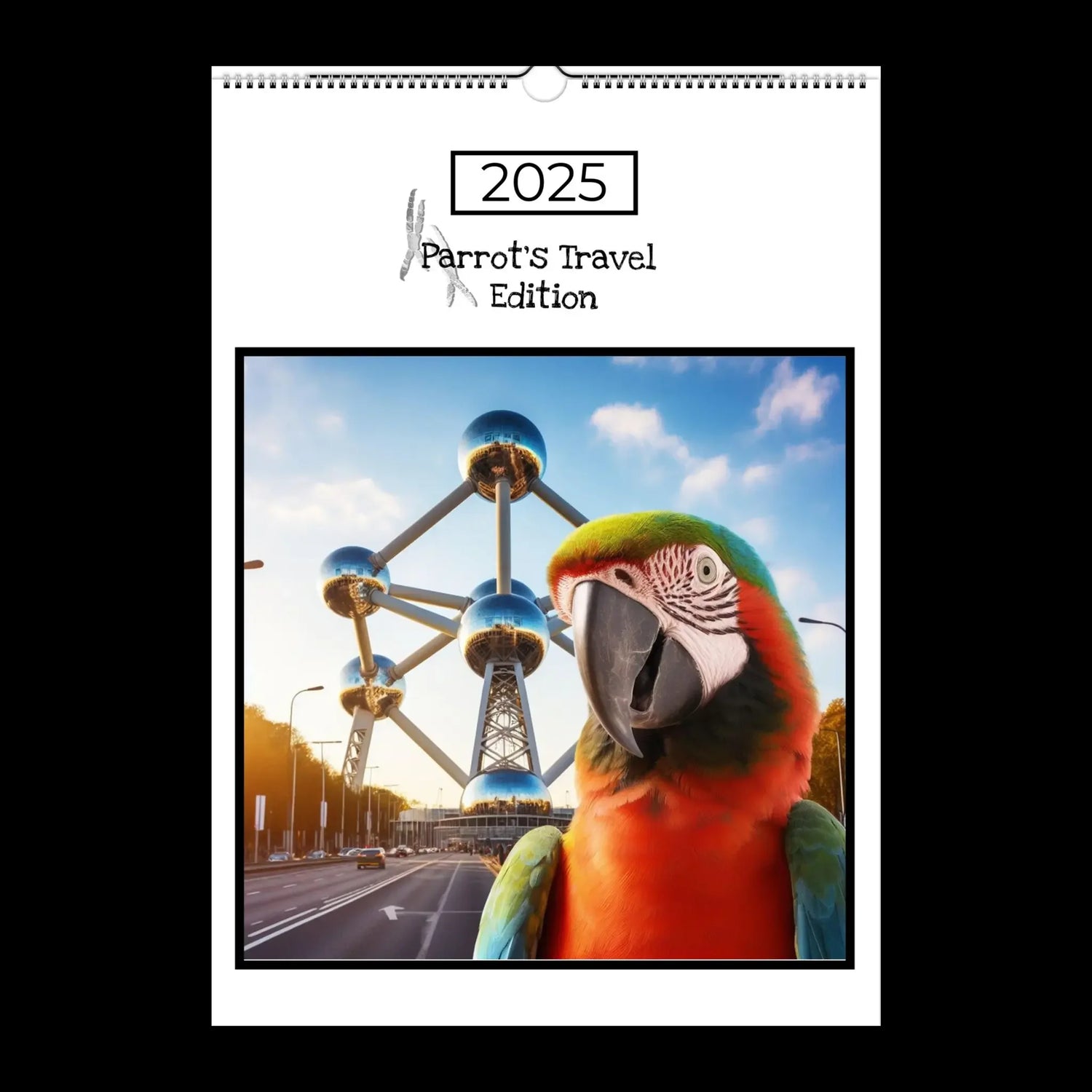Useful information
Thinking ability of 6 year old child
Parrots are very intelligent animals that require a lot of attention and variety. Consider in advance what exactly you expect when buying a parrot. Is it a spontaneous idea or do you know exactly what you want? The intelligence of parrots sometimes reaches the thinking capacity of a 6-year-old child. That is why it is good to reflect on this and make a well-considered choice.
Think about what kind
There is no such thing as the best pet parrot. Each species has its own traits and side effects. The intelligence of the bird means that it needs a lot of attention, education and variety. If you, as the owner, cannot comply with this, your parrot may screech, bite or pick itself bald. Of course you don't want this.
Company
Parrots are very social by nature. That's why they can talk too. They then, as it were, imitate their peers to impress. Because parrots are so social, a pet parrot also needs companionship. This can be done by paying a lot of attention to your well-beaked friend or by offering a companion of the same kind as company. A parrot as a pet has not been around for very long, as the animals have only recently been bred in captivity. Partly because of this, they still show a lot of natural behavior.
Time for a shower
Parrots love a nice shower. Therefore, take your parrot to the bathroom about once a week and give it a nice shower. It is also good against drying out the skin. This is because parrots are naturally used to a humid climate, which is less present in your home.
Plucking feathers
Birds of course often have beautiful plumage. Many parrots in particular can do something about it. These springs must be kept in good condition and the smart ones have come up with something for that. Parrots pluck their feathers. This gives them a sense of peace and security. Parrots also sometimes do this ritual out of boredom. When a parrot doesn't get enough challenge or attention, it only gets satisfaction from plucking itself.
Parrot in the house: living together
Of course it can also be very cozy, for example you can teach your winged friend to talk. So you can expect winged statements from your family friend in the long term! It is also fun to play with your parrot. Since the crooked beaks are very intelligent, you can do anything with them. See what is suitable for your species and try out what your own bird likes. It is also important that your bird has its own, safe place. A suitable bird cage is very important here. A parrot needs a lot of space. A large cage can serve as a permanent place, but a parrot that is kept in the house also needs space to fly or play.
Power supply
Harrison's bird foods is the only bird food that contains complete protein and when fed according to the balanced food plan, it provides complete nutrition from whole, real foods, providing your bird with a balance of antioxidants that neutralize free radicals and knock out disease genes
Poisonous Fruits & Vegetables
Discover which fruits and vegetables are dangerous for parrots and parakeets. Protect your bird by knowing what you should never feed.
Dangerous Vegetables
Avocado – Contains persin, a fatty acid that damages the heart of parrots and can be fatal, even in small amounts.
Onion, garlic, leek and chives – Lead to anemia and organ damage due to sulfur compounds.
Raw beans (especially kidney beans) – Contain lectins which are toxic and can cause fatal poisoning.
Rhubarb – High in oxalic acid, which binds calcium and leads to kidney problems.
Green potato and shoots – Contain solanine, a potent neurotoxin.
Raw eggplant – Also contains solanine; cooked and without the peel, it may be safe, but not recommended.
Tomato plant (leaf and stem) – Toxic due to tomatine; fruit must be ripe and pitted.
Mushrooms (all types) – May contain fungal toxins; birds are extremely sensitive to these.
Cabbage (in large quantities) – Disrupts thyroid function due to goitrogens.
Spinach and Swiss chard – High in oxalic acid, inhibits calcium absorption.
Brussels sprouts, broccoli, cauliflower – Gas formation and intestinal problems in sensitive species.
⸻
Dangerous Fruit
Apple seeds and seeds of cherries, peaches, plums, and apricots – Contain cyanogenic substances that form cyanide in the body.
Unripe elderberries and elderberry bush parts – Very toxic to birds.
Citrus fruits (in excess or with peel ) – Acidic and hormonally disruptive; peel contains pesticides.
Mango and papaya (pit and skin) – Only the flesh is safe; the skin and pit may contain harmful substances.
Passion fruit (unripe) – Can irritate the gut and is acidic; only give ripe fruit in small amounts.
Bananas, grapes, dates, figs – Not toxic, but very high in sugar; increases the risk of obesity and liver problems.
⸻
Caution: Even small amounts of these products can be seriously harmful. Only provide fruits and vegetables that are safe, unsprayed, and without peels or pits, and always adjust the amount to your parrot's species and sensitivity.
⸻
Poisonous Fruits and Vegetables for Parrots – Comprehensive and Species Specific
Many fruits and vegetables popular in human diets can be harmful or even fatal to parrots . Birds' digestive systems are sensitive and cannot break down certain substances as humans can. Even small amounts of certain foods can be fatal .
Below you'll find a detailed overview of what you should absolutely avoid in your parrot's diet – including common ingredients like mushrooms, onions, avocado, citrus fruits, and beans. This list applies to all parrot species, but specific sensitivities are also explained for each species.
⸻
🦜 Species-Specific Sensitivities
Each parrot species has its own sensitivities. Some are particularly sensitive to certain substances or have a slower metabolism.
African Grey Parrot (Psittacus erithacus)
This species is very sensitive to toxins and heavy metals. They should absolutely not be fed avocados, onions, fruit pits, or mushrooms. All fruits and vegetables must be unsprayed and thoroughly washed.
Macaws (Ara spp.)
Although large and robust, macaws are sensitive to high-fat foods. Avocado, fatty seeds, and high-sugar fruits like bananas and grapes should be severely limited. Mushrooms and beans without thorough preparation should be avoided.
Amazon parrots (Amazona spp.)
These birds are prone to fatty liver disease and obesity. Fatty vegetables and fruits like corn, avocado, and banana should be given in moderation. Citrus fruits can also disrupt their gut flora balance.
Eclectus parrots (Eclectus roratus)
Their gut flora is extremely sensitive. They often react to additives, sugars, and citrus fruits. Avocados, mold-bearing products like mushrooms, and synthetically processed fruit products (such as dried fruit with sugar) are not recommended.
Cockatoos (Cacatua spp.)
Cockatoos are very sensitive to hormones. Products like bell peppers, citrus fruits, and sugary fruits can increase this activity. Avocado and mushrooms are strictly forbidden. Pay extra attention to the amount of fruit in their diet.
Caiques, senegals, pionuses (Poicephalus spp.)
These smaller species can be more susceptible to diarrhea and digestive problems. Avoid citrus fruits, avocados, or products high in oxalic acid. Cooked vegetables are often more digestible.
Cockatiels and budgerigars
Even small amounts of toxic substances are life-threatening for them. Even traces of avocado, mushrooms, onions, or fruit pits can be fatal. Only unsprayed, organic fruits and vegetables, without peels or pits, should be fed.
Poisonous Vegetables
Avocado is without a doubt the most dangerous vegetable for parrots . This fruit contains a substance called persin, which attacks the bird's heart and can be fatal within hours, even in very small doses. The flesh, skin, and pit are all poisonous.
Onions, leeks, garlic, and chives belong to the allium family and contain sulfur compounds that damage red blood cells. This leads to anemia and ultimately death. Even when cooked, these vegetables remain dangerous to birds.
Raw beans , especially red kidney beans , contain lectins (such as phytohemagglutinin) that are toxic when consumed uncooked. It's essential that beans, if given, are always fully cooked. However, the risk is so high that it's best to avoid them entirely.
Rhubarb contains oxalic acid, which hinders calcium absorption in the body. In larger doses, it can cause kidney problems. Rhubarb is also not a safe vegetable for parrots.
Green potatoes or potato shoots contain solanine, a neurotoxin that can cause nausea, convulsions, and respiratory problems. Most birds will instinctively avoid these bitter parts, but even small amounts are risky.
Tomato plants —note: not the fruit, but the leaves and stems —contain tomatine, which is poisonous to birds. Ripe, pitted tomatoes are fine in moderation, but make sure there are no green parts or stems attached.
Mushrooms , even edible varieties for humans , are not recommended for parrots. They contain natural fungal compounds that can be toxic to birds, especially since their livers are much more sensitive to toxins than those of humans.
Cabbage varieties such as white cabbage, broccoli, pointed cabbage, and kale contain goitrogens that, in large doses, can affect the thyroid gland. A small amount, lightly steamed, is not immediately dangerous for most parrots, but frequent consumption is not recommended.
Raw eggplant , like potatoes and tomatoes , belongs to the nightshade family and contains solanine. Cooked and peeled, it's less problematic, but caution is still advised.
Brussels sprouts and other vegetables containing high levels of sulphur are not poisonous, but they cause gas and can cause digestive problems in birds with sensitive intestinal flora.
Zucchini and cucumber aren't toxic in themselves, but they contain very few nutrients. Excessive consumption can cause diarrhea or lead to deficiencies in essential vitamins.
Spinach and Swiss chard contain oxalic acid, which binds calcium in the body and can thus cause deficiencies. Small amounts are not a problem, but they should not be a major part of the diet.
⸻
Poisonous or Risky Fruit
Although fruit seems healthy in principle, there are some important exceptions when it comes to birds. The greatest danger often lies in the seeds of the fruit.
Apple seeds , like pear, cherry, plum, apricot, and peach seeds, contain cyanogenic glycosides that are converted to cyanide in the body. Only the flesh is safe; the seeds should always be carefully removed.
Unripe elderberries and parts of the plant are poisonous to birds. Ripe berries can be given in moderation, but there is a high risk of confusion with unripe ones.
Wild berries or unknown berries found in nature are generally best avoided unless you're certain they're safe. Blueberries, raspberries, and blackberries, on the other hand, are safe as long as they're not sprayed.
Citrus fruits such as oranges, mandarins, lemons, and limes can be given in moderation , but only the pulp . The peel, especially of non-organic fruits, contains pesticides and mold inhibitors that are very harmful. Excessive citrus can also disrupt the digestive system or increase hormonal activity, especially in Eclectus parrots and cockatoos.
Mango and papaya are generally safe in small quantities, but the peel and pit are not suitable. The flesh should only be given when fully ripe and without additives.
Passion fruit is naturally acidic and can irritate the digestive system, especially if unripe. Only ripe passion fruit, cut into small pieces, is safe.
Bananas, grapes, figs, and dates are energy-rich and high in sugar. They're not toxic, but regular consumption can lead to weight gain or disrupted gut flora. So, use this type of fruit as an exception or a treat.
⸻
Have any further questions? Don't hesitate to contact us!
Invisible Dangers ☠️
Do you know which invisible dangers could threaten your parrot? Learn more about hidden risks in your home and how to prevent them.
Parrots and birds have extremely sensitive respiratory systems . Their lungs and air sacs make them particularly vulnerable to fumes, odors, and chemicals that may seem harmless to humans, but can cause serious health problems or even death in birds . Therefore, it's essential to know which scents and products to avoid in a household with a parrot.
🕯️ Scented candles and incense
Why harmful?
Scented candles often contain synthetic perfumes, dyes, and petrochemicals. Burning releases volatile organic compounds (VOCs) such as benzene and toluene, which are extremely toxic to birds. Even natural or "ecological" candles (such as those based on soy or beeswax) are not necessarily safe if fragrances have been added.
Incense works in a similar way, releasing smoke and aromatic oils that can severely irritate your parrot's respiratory tract.
Alternative?
Don't use any scented products near your parrot. Ventilate your home naturally and use an air purifier without ozone if necessary.
🌬️ Air fresheners (sprays, plugs, gels)
Why harmful?
These products often contain a cocktail of chemical fragrances, propellants, and other volatile substances. They linger in the air for extended periods and settle in fabrics, carpets, and even on your parrot's feathers. Some substances, such as formaldehyde or phthalates, are carcinogenic and can cause acute respiratory problems in birds.
Please note: Even “natural” or “organic” air fresheners may contain essential oils that are toxic to birds.
👃 Perfume, aftershave and hairspray
Why harmful?
Perfumes and cosmetics contain strong fragrances and alcohol. If you spray these on yourself and then come near your parrot, they will inhale these fumes. Hairspray, in particular, is extremely dangerous because it forms a fine mist that spreads quickly.
Consequences may include:
Sneezing or wheezing
Shortness of breath or chest tightness
Poisoning
Sudden death
Alternative?
Apply perfumes or sprays only in another room and let them evaporate completely before returning to your parrot. Use scented products as sparingly as possible.
🧴 Cleaning products and bleaches
Why harmful?
Many traditional cleaning products contain ammonia, chlorine, phenols, or other harmful chemicals. Even the scent of these products is often toxic to birds. Vapor formation when using hot water steam increases the risk of inhalation.
Also pay attention to:
Window cleaners
Descalers
All-purpose cleaners with lemon or pine scent
Alternative?
Use vinegar and baking soda as safe cleaning options. Ensure good ventilation.
🧪 Teflon and non-stick coatings (overheating = deadly gas)
Why harmful?
When Teflon or similar non-stick coatings on cookware, sandwich makers, or ovens are heated above a certain temperature (around 260°C), they can release polytetrafluoroethylene (PTFE) vapors. These vapors are quickly fatal to birds, often within minutes.
Also pay attention to:
Irons
Toasters
Heating elements with non-stick coatings
🌿 Essential oils and aromatherapy
Why harmful?
While popular with people for relaxation or therapy, essential oils (such as eucalyptus, tea tree, lavender, lemon, peppermint, etc.) are not safe for birds. Even a diffuser on a low setting can release toxic fumes.
Implications:
Inhalation poisoning
Skin or eye irritation
Breathing problems
🚬 Smoke from tobacco, vapes, and cannabis
Why harmful?
All forms of smoke contain harmful substances, including carbon monoxide, tar, and other toxins. Even passive smoking can cause serious respiratory problems in parrots. Vaping and e-cigarettes are no safer—they contain nicotine and fragrances that are dangerous when vaporized.
Also dangerous:
Nicotine on hands or clothing (can be absorbed through the parrot's feet or beak)
Ashes that are eaten
💅 Nail polish, acetone and solvents
Why harmful?
Fumes from nail polish, nail polish remover, paint thinners, or glue contain powerful volatile compounds. These can quickly cause respiratory problems in parrots.
💨 Other harmful fumes and substances
New furniture or carpets: may emit formaldehyde or other fumes (off-gassing).
Glue or silicone sealant: often with harmful fumes.
Paint and varnish: fumes often linger for days.
Fabric softeners and scented detergents: odors can stick to your clothes.
Ozone air purifiers: Ozone is toxic to birds.
Car air fresheners: dangerous when the parrot goes on the road
✅ In summary: what can you do?
Do not use fragrances or vapors that are not strictly necessary.
Choose odorless, bird-safe cleaning products.
Ventilate well when cleaning or cooking.
Wash your hands and clothes if you come into contact with perfume or smoke.
Do not use scented candles, incense or air fresheners.
Be careful with new purchases: let furniture or carpets air out thoroughly before bringing them into your home.
Ensure good air circulation and consider a bird-safe air purifier (no ozone!).
❤️ Remember:
What you perceive as "fresh" or "tasty" could literally be the death of your parrot. Their life depends on the air you keep safe for them.
Have any further questions? Don't hesitate to contact us!
Poisonous plants ☠️
Learn which plants are poisonous to parrots and parakeets. Prevent health risks by knowing which plants are best kept away from your bird.
If you have parrots or other birds, it's important to know which plants are poisonous. Many popular houseplants and garden plants contain substances that are harmful or even life-threatening to your feathered friends.
This overview will help you make your home safe and prevent accidents. 🪴
Dumb stick (Dieffenbachia)
Why poisonous: Contains sharp crystals that cause swelling and pain in the mouth and throat, making eating and breathing difficult.
Philodendron (Philodendron species)
Why poisonous: Similar to dieffenbachia; causes irritation due to calcium oxalate crystals.
Goldenvine (Epipremnum aureum, also known as Scindapsus)
Why toxic: Contains oxalate crystals which cause a burning sensation and irritate mucous membranes.
Oleander (Nerium oleander)
Why toxic: Contains cardiac glycosides which can cause heart rhythm disturbances and are life-threatening.
Rhododendron / Azalea (Rhododendron)
Why poisonous: Contains grayanotoxins which affect the nervous system and can cause paralysis.
Monstera (Monstera deliciosa)
Why toxic: Contains oxalic acid, which causes irritation to the mouth and throat.
Cyclamen (Cyclamen persicum)
Why poisonous: The roots in particular are poisonous and can cause serious stomach and intestinal complaints.
Palm fern / Sago palm (Cycas revoluta)
Why poisonous: Contains the powerful poison cycasine, which can cause liver failure and death.
Kalanchoe (Kalanchoë blossfeldiana)
Why poisonous: Contains substances that can affect the heart and cause vomiting and diarrhea.
Ivy (English Ivy, Hedera helix)
Why poisonous: Contains saponins which can cause digestive and breathing problems.
Zamioculcas (ZZ plant)
Why toxic: Contains calcium oxalate crystals which cause irritation.
Wonder tree / Wonder tree (Ricinus communis)
Why Toxic: Contains ricin, one of nature's deadliest toxins.
Christmas Star (Poinsettia)
Why toxic: Mildly toxic, may cause mild irritation to mouth and stomach.
⸻
Important warning! ⚠️
Even small amounts of these plants can cause serious symptoms in parrots, such as salivation, vomiting, respiratory problems, and paralysis. Never leave these plants within reach of your birds.
⸻
Safer alternative for indoors with birds
• Grass lily (Chlorophytum comosum)
• Areca palm
• Golden Oriole (Dypsis lutescens)
• Felt plant (Soleirolia soleirolii)
Please note : even with safe plants it is better to limit gnawing.
⸻
Parrots naturally nibble on anything they encounter. Plants that seem harmless to humans can be deadly to birds.
🆘 Symptoms of poisoning in birds
Do you recognize any of these signs? Contact an avian veterinarian immediately:
• Salivation or foaming in the mouth
• Tremors or weakness
• Diarrhea or vomiting
• Shortness of breath
• Sudden collapse or fainting
⸻
This list will help you protect your parrots and other birds from poisonous plants in your home and garden.
⸻
Have any further questions? Don't hesitate to contact us!
Best fruits and vegetables for parrots and parakeets
Find out which fruits and vegetables are healthiest for your parrot or parakeet.
Vitamin A is essential for a strong immune system, healthy eyes, skin, feathers, and respiratory system. Many parrots, especially Amazons, African Greys, and cockatoos, are deficient in vitamin A when fed a diet that is too limited (e.g., only seed mixes). Vegetables are the best natural source!
Amazon parrots
Amazons have a tendency to become overweight, but also have a high need for vitamin A.
Best vegetables:
Carrot (raw or steamed – rich in beta-carotene)
Red bell pepper (vitamin A + C)
Pumpkin (steamed, rich in beta-carotene)
Sweet potato (boiled or steamed, no additives)
Endive, kale, Swiss chard (dark green leafy vegetables – packed with nutrients)
Fruit in moderation:
Mango (rich in vitamin A)
Papaya
Pomegranate (antioxidants)
Banana (potassium, not too often because of sugars)
African grey redstart
Sensitive to vitamin A deficiency and stress. Benefit from antioxidants and beta-carotene.
Best vegetables:
• Carrot
• Red pepper
• Spinach (in moderation due to oxalates)
• Sweet potato
• Broccoli (lightly steamed)
Fruit in moderation:
• Mango
• Papaya
• Blueberries (antioxidants)
• Kiwi (vitamin C)
Macaws
Have high energy needs and can tolerate more fat and fruit than other varieties.
Best vegetables:
• Pumpkin
• Carrot
• Red pepper
• Green asparagus
• Swiss chard
Fruit (more widely permitted):
• Mango
• Papaya
• Pomegranate
• Grapes (not too often)
• Apple (without seeds)
Cockatoos
Prone to obesity and feather plucking – focus on high-fiber vegetables and low sugar.
Best vegetables:
• Endive
• Broccoli
• Carrot
• Celery
• Courgette
Fruit (very limited):
• Kiwi
• Apple
• Papaya
Parakeets (such as budgerigars, cockatiels)
Small stomachs mean small portions. Vitamin A is essential here too.
Best vegetables:
• Carrot (grated)
• Spinach (in moderation)
• Romaine lettuce (not iceberg lettuce)
• Red bell pepper
• Sprouts (such as alfalfa)
Fruit :
• Berries
• Apple (without seeds)
• Pear
• Mango (mini piece)
❗ Do not give:
• Avocado (poisonous!)
• Onions, garlic, leek
• Chocolate, coffee
• Salt or sugar
• Rhubarb
• Raw beans (always cook!
ℹ️ Feeding Tips
Combine colors – “the more colorful the better” for a wide variety of nutrients.
Cut everything into small pieces or make a vegetable mix (parrot salad).
Vary daily to avoid boredom.
Introduce new flavors slowly. Some birds are picky!
Eat the fruit or vegetable yourself in front of your parrot – parrots are curious eaters and often learn by imitating you.
-
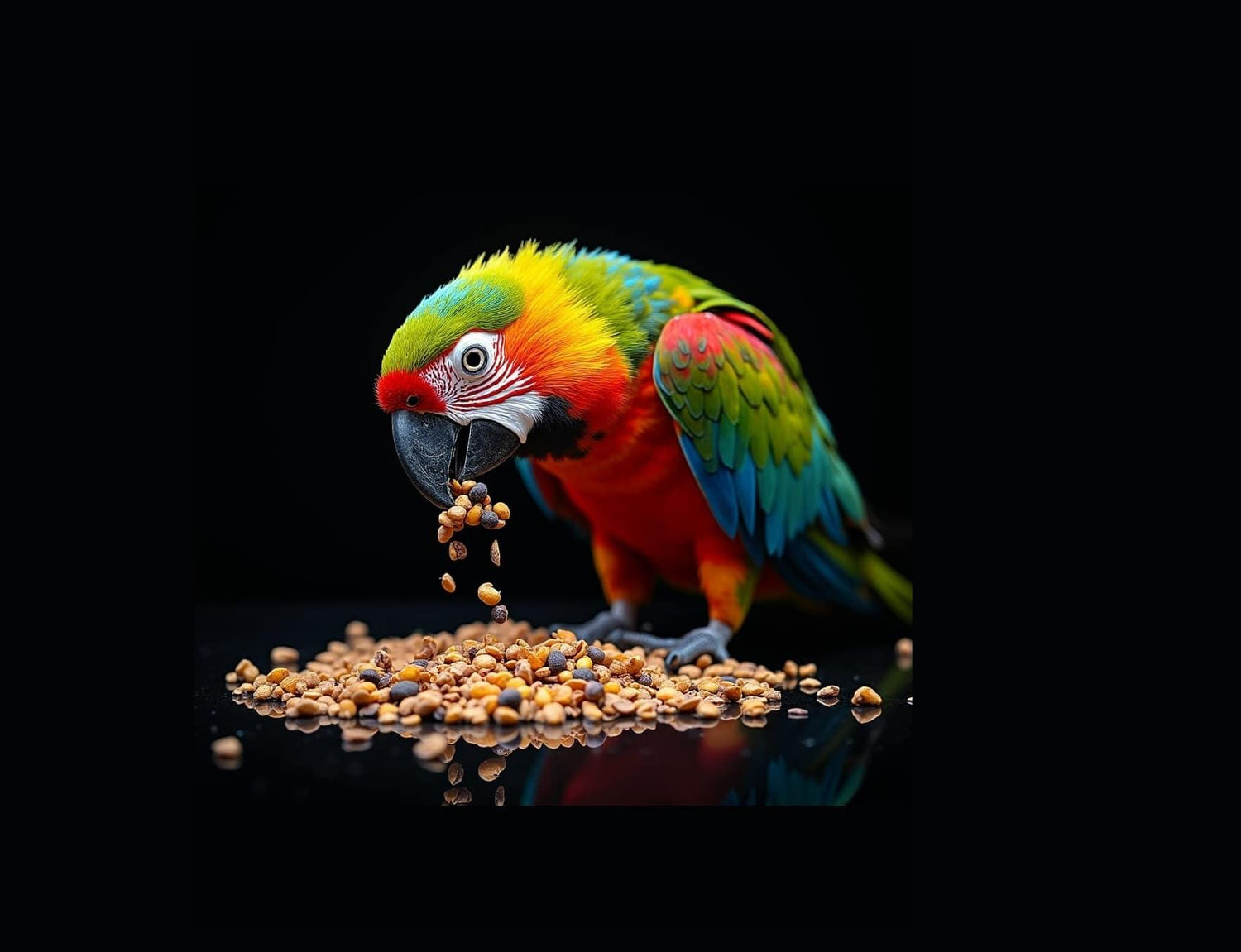
Food & Treats
At Parrotshop we understand how important the right food is for the...
-
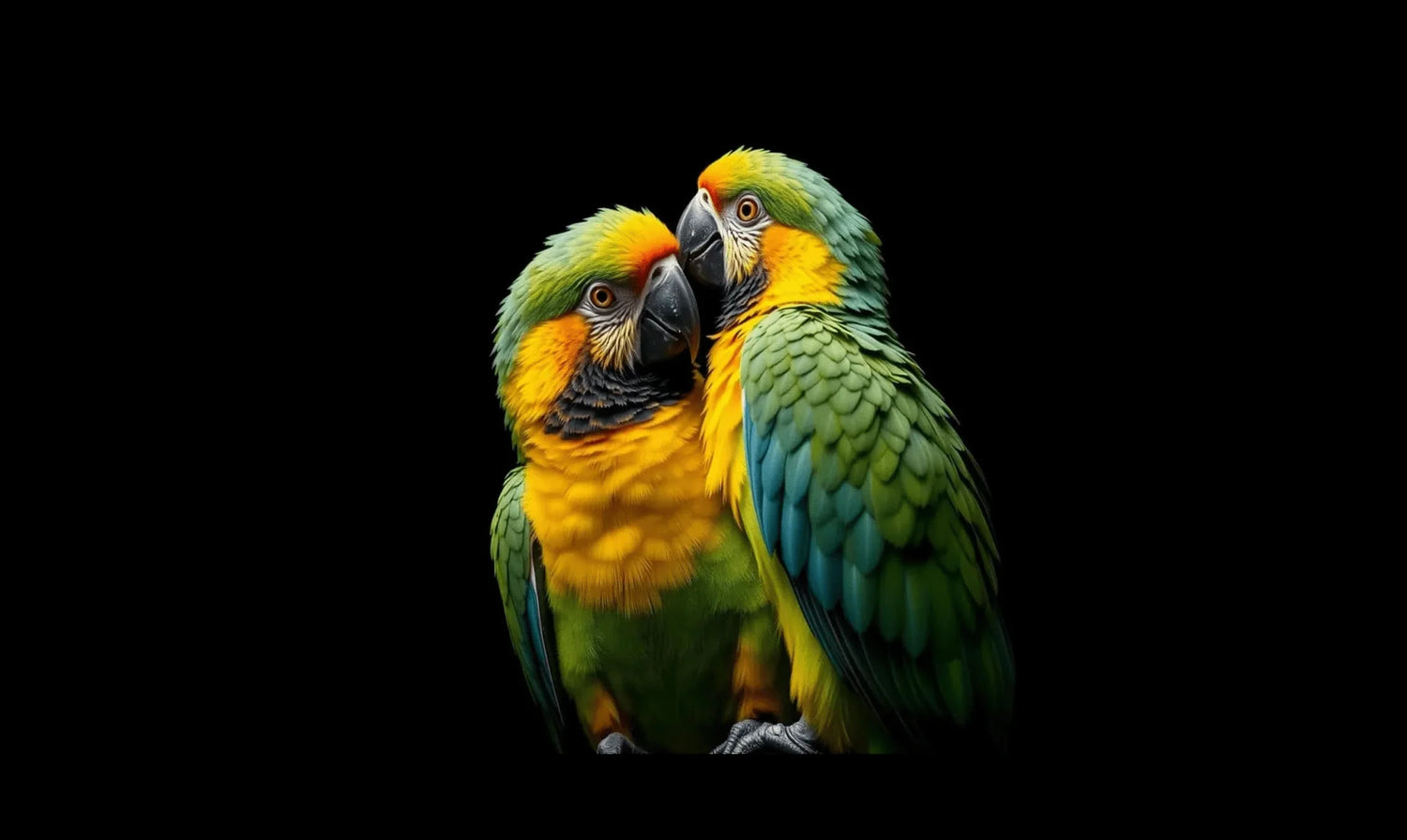
Health & Care
Here you will find our assortment!A healthy bird is a happy bird...
-
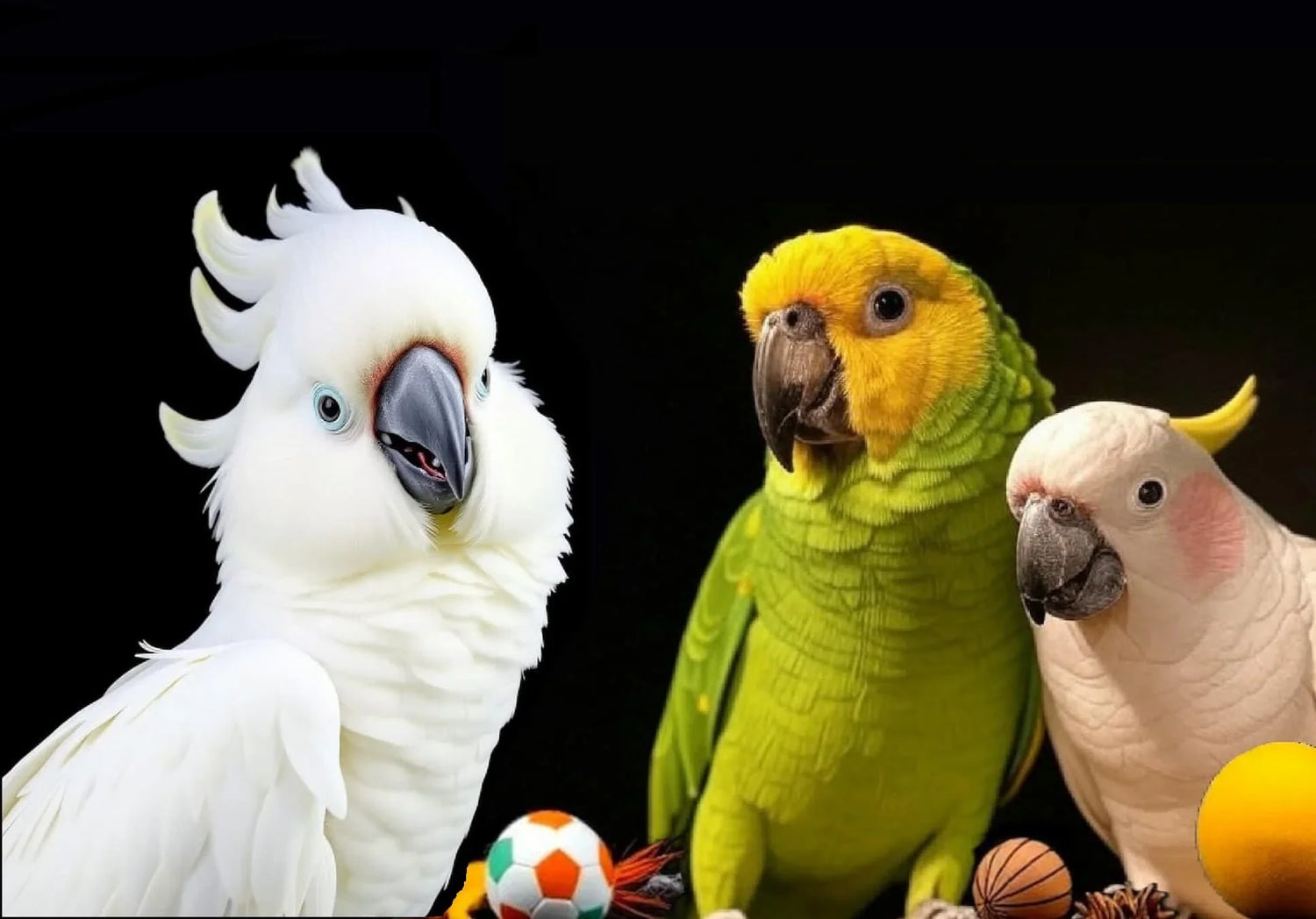
Play & activity
Promote mental and physical stimulation and relieve anxiety by providing entertainment. In...
-
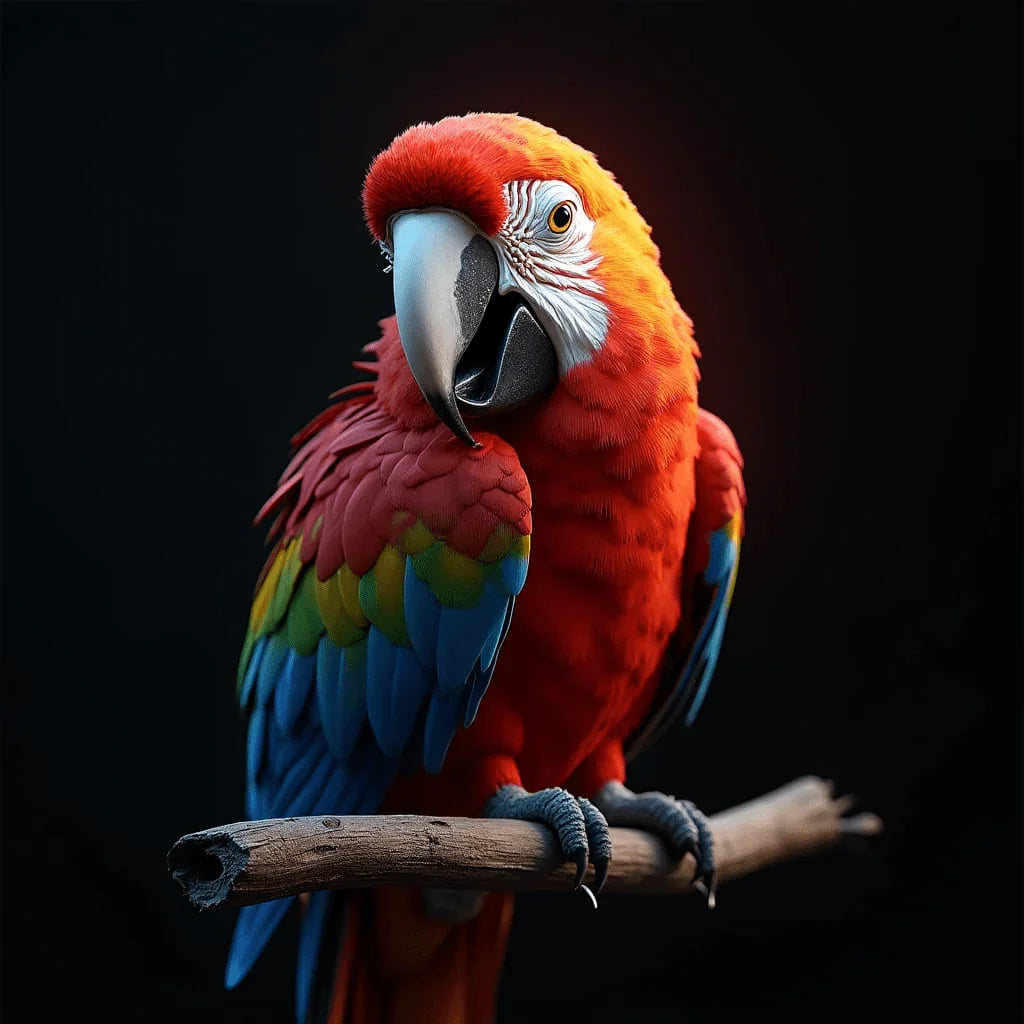
Perches & co
Perches should of course not be missing in a bird cage. Parrot...
-
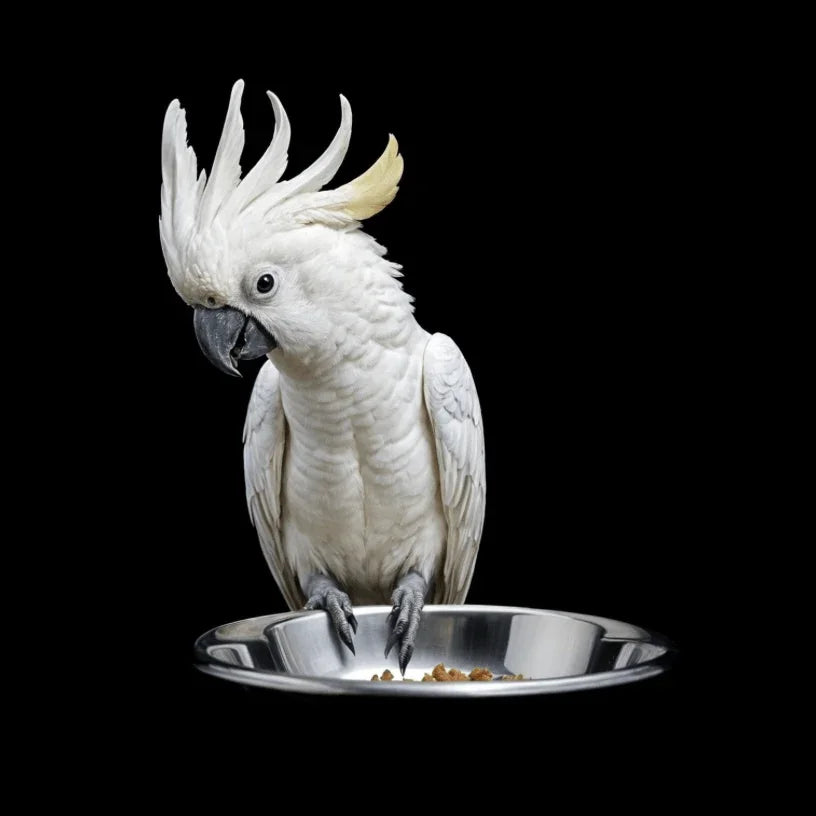
Accessories & Supplies
In the Accessories & Supplies category, you'll find everything you need to...
-
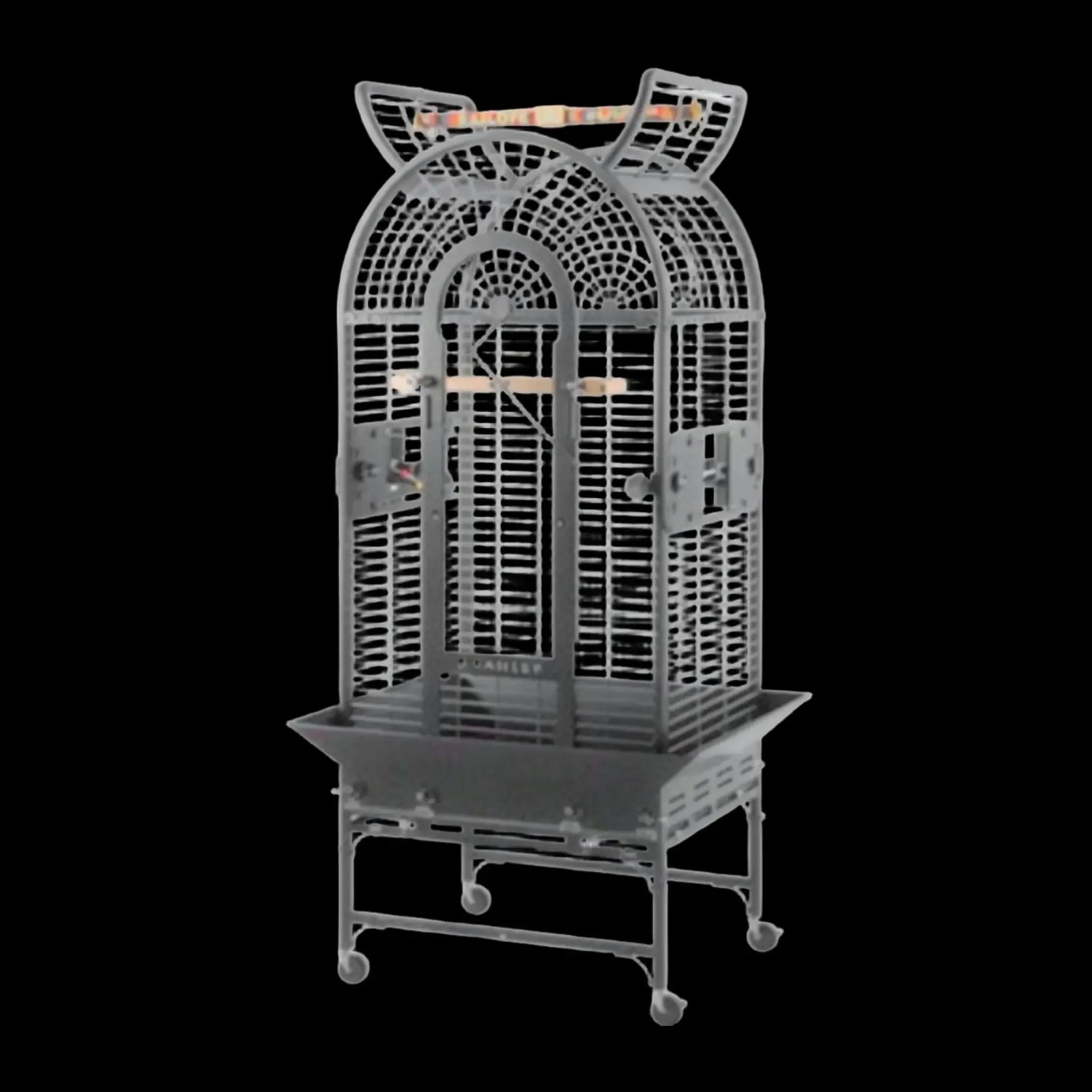
Cages & Playgrounds
Original Strong parrot cages have a rock-hard and non-toxic coating to prevent...
